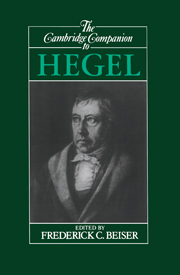Book contents
- Frontmatter
- Introduction
- 1 Hegel's intellectual development to 1807
- 2 You Can't Get There from Here
- 3 Hegel's conception of logic
- 4 Hegel's idealism
- 5 Hegel's dialectical method
- 6 Thought and being
- 7 Hegel's ethics
- 8 The basic context and structure of Hegel's Philosophy of Right
- 9 Hegel's historicism
- 10 Hegel on religion and philosophy
- 11 Hegel's aesthetics
- 12 Transformations of Hegelianism, 1805-1846
- 13 Hegel and Marxism
- 14 Hegel and analytic philosophy
- Bibliography
- Chronology
- Index
4 - Hegel's idealism
The logic of conceptuality*
Published online by Cambridge University Press: 28 May 2006
- Frontmatter
- Introduction
- 1 Hegel's intellectual development to 1807
- 2 You Can't Get There from Here
- 3 Hegel's conception of logic
- 4 Hegel's idealism
- 5 Hegel's dialectical method
- 6 Thought and being
- 7 Hegel's ethics
- 8 The basic context and structure of Hegel's Philosophy of Right
- 9 Hegel's historicism
- 10 Hegel on religion and philosophy
- 11 Hegel's aesthetics
- 12 Transformations of Hegelianism, 1805-1846
- 13 Hegel and Marxism
- 14 Hegel and analytic philosophy
- Bibliography
- Chronology
- Index
Summary
The term “absolute idealism” is generally used to characterize the metaphysical view that Hegel presents in his philosophy. Although this phrase does not occur often in Hegel's work, he does use it to describe his own philosophy: “The position taken up by the concept is that of absoulte idealism” [EnL 160 Z; 8, 307]. Since Hegel uses the term “the concept” to signify a set of philosophic categories that contain an accurate description of the real, we can take this statement to indicate that the term “absolute idealism” is an appropriate means of characterizing his philosophy.
But what exactly is absolute idealism? Hegel provides us with some insight into his understanding of this phrase in a passage that describes the ontological status of the concept.
It is a mistake to imagine that the objects which form the content of our mental ideas come first and that our subjective agency then supervenes, and by the aforesaid operation of abstraction, and by colligating the points possessed in common by the objects, frames concepts of them. Rather the concept is the genuine first; and things are what they are through the action of the concept, immanent in them, and revealing itself in them.
(EnL 163 Z2; 8, 313)- Type
- Chapter
- Information
- The Cambridge Companion to Hegel , pp. 102 - 129Publisher: Cambridge University PressPrint publication year: 1993
- 16
- Cited by

